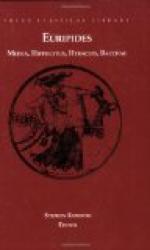|
This section contains 1,547 words (approx. 6 pages at 300 words per page) |

|
Is 'hippolytus' a Tragedy of Revenge?
Dionysus, the patron god of Greek theatre, regularly had the three famous elements of his power portrayed on stage. Comedy often made drink the topic for its jokes, the satyr plays focused heavily on sex and tragedy frequently revolved around his facet of madness and revenge . Aristotle wrote of tragedies as including "calamity" which would be "of a destructive or painful nature, such as death, excessive suffering, wounding and the like" . With such powerful and emotive action occurring, it is natural that sometimes anger and vengeance are inspired. Revenge was a common theme for tragedy, present in plays from Aeschylus' Oresteia, to Sophocles' Antigone. Arguably one of the most straight-forward revenge tragedies, Euripides' Medea, makes a dramatic contrast to his later Hippolytus.
Of course, tragedy does not always bear any obvious relationship to revenge. In Oedipus The King by Sophocles, fate and...
|
This section contains 1,547 words (approx. 6 pages at 300 words per page) |

|


